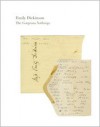Currently reading
Saints in Art
The Gorgeous Nothings: Emily Dickinson's Envelope Poems
Selected Poems
Emily Dickinson
Lies My Teacher Told Me : Everything Your American History Textbook Got Wrong
Gone with the Wind
An Unfortunate Mother's Advice to her Absent Daughters, in a Letter to Miss Pennington
 Heavy nerd territory, so I'll sum it up for you. The Unfortunate Mother in question, an eighteenth-century woman named Lady Sarah, married a second son named Joseph Pennington who seems only to have wanted her for her money – second sons are the ones who don't inherit, remember. Ironically, this man's older brother died childless, leaving him the family baronetcy after all. You just never know, even if you are a second son. (If you're a fifth son – seriously, dude. Give it up and get a job, already.)
Heavy nerd territory, so I'll sum it up for you. The Unfortunate Mother in question, an eighteenth-century woman named Lady Sarah, married a second son named Joseph Pennington who seems only to have wanted her for her money – second sons are the ones who don't inherit, remember. Ironically, this man's older brother died childless, leaving him the family baronetcy after all. You just never know, even if you are a second son. (If you're a fifth son – seriously, dude. Give it up and get a job, already.) Also ironically, Sarah's father wrote his will in such a fashion that his fortune was left specifically to her, and could not be touched or inherited by her husband. (Apparently, Sarah's dad had met Sarah's husband when he made this provision in his will. Clearly Sarah's dad was not impressed.)
The marriage ended badly. The couple did not divorce, but they did legally separate after Joseph publicly accused Sarah of adultery. Thanks to the "independent fortune" left her by her father, she could survive on her own; but the children stayed with their father when Sarah left, as the law required at the time.
So Sarah, now Lady Sarah Pennington, wrote a letter to her daughters. Rather than just sending it to their house, however, she published it. Because this wasn't just any letter; it was one in which Lady Sarah proclaimed her innocence, and threatened to publish another such letter, this one with a lot more personal details, if certain people who shall remain nameless but whose initials were My Husband, That Rat Bastard didn't stop saying that Lady Sarah was a total ho-bag.
Fortunately for Lady Sarah, this tactic worked. Unfortunately for readers like me who would have enjoyed getting some dirty details about her marriage, this tactic worked.
This letter/book is a Georgian conduct guide. So far as I can see, etiquette books such as the sort we have now – the kind that explain which fork to use and how to properly address a baronet – didn't come into existence until the Victorian period. Before that, guides for young people were moral and philosophical works, explaining that you really should try to be a good person.
"Good" sometimes meant the same thing whether you were male or female. Lady Sarah's advice on how to interact with servants, for instance, probably applied to everyone. Okay, "getting too familiar" with the servants probably meant something a lot different if you were a guy (cough). But the gist of the advice Lady Sarah offers here – keep your distance, pal – was still a good idea.
Some of the advice in this book holds up fine even to modern-day readers. Paying your bills promptly rather than being "upon the Books of every Tradesman" is still a good idea, even if we call our various methods of acquiring credit something different now (Mastercard, Visa, and How Did My Student Loan Actually Get Bigger After I Spent The Last Five Years Trying To Pay It Off).
However, some of the advice is stuff you'd never hear now, such as warnings against reading too much fiction. Yeah. That's a big issue these days – our kids are reading too many of them new-fangled novels. This is very bad, because it robs them of time they might spend, say, perfecting their rocket-jumping skills in Team Fortress.
And of course some of the advice doesn't apply now and didn't apply then for the simple reason that teenagers have never, ever listened to idiot grownups when it comes to how many hundreds of hours a day those teenagers spend lovingly perfecting their wardrobes.
Sadly, one such piece of Just Won't Be Listened To advice has to do with the tendency of a certain kind of woman to see a Bad Boy and think, "That's the guy for me! I'll be the one to make him mend his ways – though of course he'll hang on to a certain edgy charm, because otherwise he'd be just another boring nice guy. Okay, by 'mend his ways' I mean 'be willing to be monogamous once he's with me, even though he's never been faithful to anyone for longer than twenty minutes at a stretch.' Oh, and of course he'll be sweet to me even though he can still be a dick to everyone else. Because that's sexy!"
(sigh)
How sad is it that we sensible types have been trying to explain how big a load of loadness this is for hundreds of years now, and still there are plenty of women who think Heathcliff is tameable if you just try hard enough?
Anyway. I read this for free via Google Books. It's short – under a hundred large-print, wide-margin pages – and pretty entertaining, in spite (or maybe because) of barf-worthy passages like the one where Lady Sarah explains to her daughter how grateful she should be if her husband has the occasional affair but doesn't tell her, because that means he loves and respects her and doesn't want to hurt her feelings. I was waiting for her to add, "Plus he was probably thinking of you the whole time." She didn't, which is something to be grateful for, I suppose.
I was able to read some of the introduction to the critical edition of this book online for free. I was very impressed, and immediately wanted to buy a copy. Then I saw that it was $50 for a paperback book that runs less than 200 pages – and bear in mind, most of those pages were written by dear Lady Sarah. So screw it.
If, however, you become so fascinated by this book that you have to have the pricy annotated edition – would you mind letting me borrow it sometime? I'll make you brownies. Thank you.








